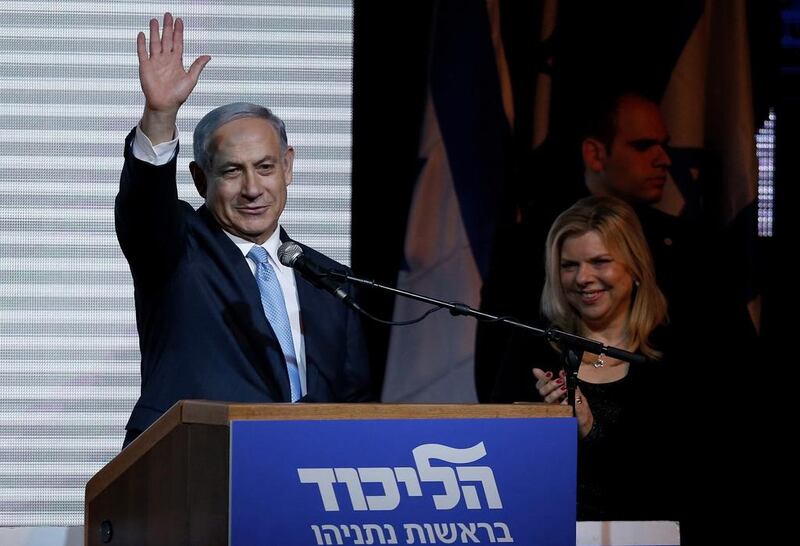NEW YORK // Benjamin Netanyahu attempting to backtrack on statements about his opposition to a Palestinian state is unlikely to dampen anger in Washington towards the Israeli prime minister.
In the final days of a tight parliamentary election race that Mr Netanyahu’s Likud party won, the divisive politician reversed his support for Palestinian statehood, saying it would never happen under his watch. This move effectively closed the door on two decades of US efforts to broker a two-state solution.
Yet, on Thursday Mr Netanyahu said he hadn’t changed his policy and that a two-state solution is possible if conditions in the region improve.
Even before the statement, Israeli analysts had expected Mr Netanyahu to attempt to walk back his comments, but they thought it would have little effect on the White House.
Even when he did voice support for a Palestinian state in 2009, “it was for something like [an area] which is really controlled by Israel”, said Shlomo Avineri, professor of political science at the Hebrew University of Jerusalem.
Speaking before Mr Netanyahu’s reversal, Mr Avineri added that “he may try to recalibrate [his position] but there may not be much credibility now to this recalibration”.
Even as Mr Netanyahu now tries to clarify his position, the political reality of his expected right-wing government is unlikely to lead to changed policy.
"The coalition he is likely to build is a coalition of the right-wing and the ultra orthodox," said David Horovitz, founding editor of the Times of Israel. "And he won't have much support for … a slightly softened position."
Officials in Washington are now evaluating if they should change their stance towards Palestinian efforts to independently pursue statehood, which would be a blow to Mr Netanyahu.
Blame for the failed negotiations can now be placed on Israel, giving renewed impetus and political cover for the United Nations Security Council to pass a resolution enforcing a final agreement on Palestinian statehood.
Also, now, the United States may not veto any such resolution — as it has consistently done in the past — or perhaps abstain.
“Steps that the United States has taken at the United Nations had been predicated on this idea that the two-state solution is the best outcome,” White House press secretary Josh Earnest said on Thursday.
“Now our ally in these talks has said that they are no longer committed to that solution. That means we need to re-evaluate our position in this matter, and that is what we will do moving forward.”
The Palestinian Authority last year campaigned at the UN for a resolution it had drafted after the last failed round of US-sponsored talks that set a framework for renewed negotiations with a three-year deadline for statehood. The US vetoed that resolution.
But a vote on a French version of the resolution was delayed to await the outcome of the Israeli election on Tuesday. With Mr Netanyahu back in office, the French resolution could become the basis for a renewed push at the UN, this time with US support.
Questions over US policy toward international efforts to back Palestinian statehood come ahead of Palestinian plans to file a case at the International Criminal Court next month that alleges Israel’s settlement building is a war crime.
During his election campaign, Mr Netanyahu admitted that his approval of the Har Homa settlement in East Jerusalem being constructed was a strategic move to break apart Jerusalem from any Palestinian territory.
The US is unlikely to back a war crimes claim, but the threat of the Palestinians filing such a case could lead Washington to support a new Security Council resolution over settlements.
Israel has received the most US military aid of any country over the past 60 years, and that close security relationship will not be affected by Mr Netanyahu’s position on the Palestinians.
Indeed, Mr Netanyahu himself stressed on Thursday that the US and Israel are each other’s greatest allies and have no choice but to work together.
But Mr Netanyahu’s campaign remarks will certainly make his relationship with Mr Obama even more fraught, and the two men are unlikely to engage one-on-one, allowing the bilateral relationship to instead be handled by cabinet ministers and the military.
During his campaign, Mr Netanyahu warned Jewish Israelis that Arab citizens were “coming out in droves”, in an attempt to get conservatives to the polls.
Following this, the White House used unprecedented language to condemn Mr Netanyahu.
The rhetoric “sought to, frankly, marginalise Arab-Israeli citizens,” Mr Earnest said on Wednesday. “The United States and this administration is deeply concerned by divisive rhetoric that seeks to marginalise Arab-Israeli citizens.”
Mr Netanyahu may hope to ride out the acrimony caused by his campaign until US elections bring a new president into office.
Mr Avineri added that Mr Netanyahu’s current strategy is possible to maintain in the face of likely renewed international efforts to support the Palestinians.
“Netanyahu can mobilise people in the sense that ‘well the whole world is against us and therefore we have to stand strong,’” he added. “[H]e may do it but at a terrible cost to Israel.”
tkhan@thenational.ae
* With additional reporting by Agence France-Presse, Associated Press, Reuters





